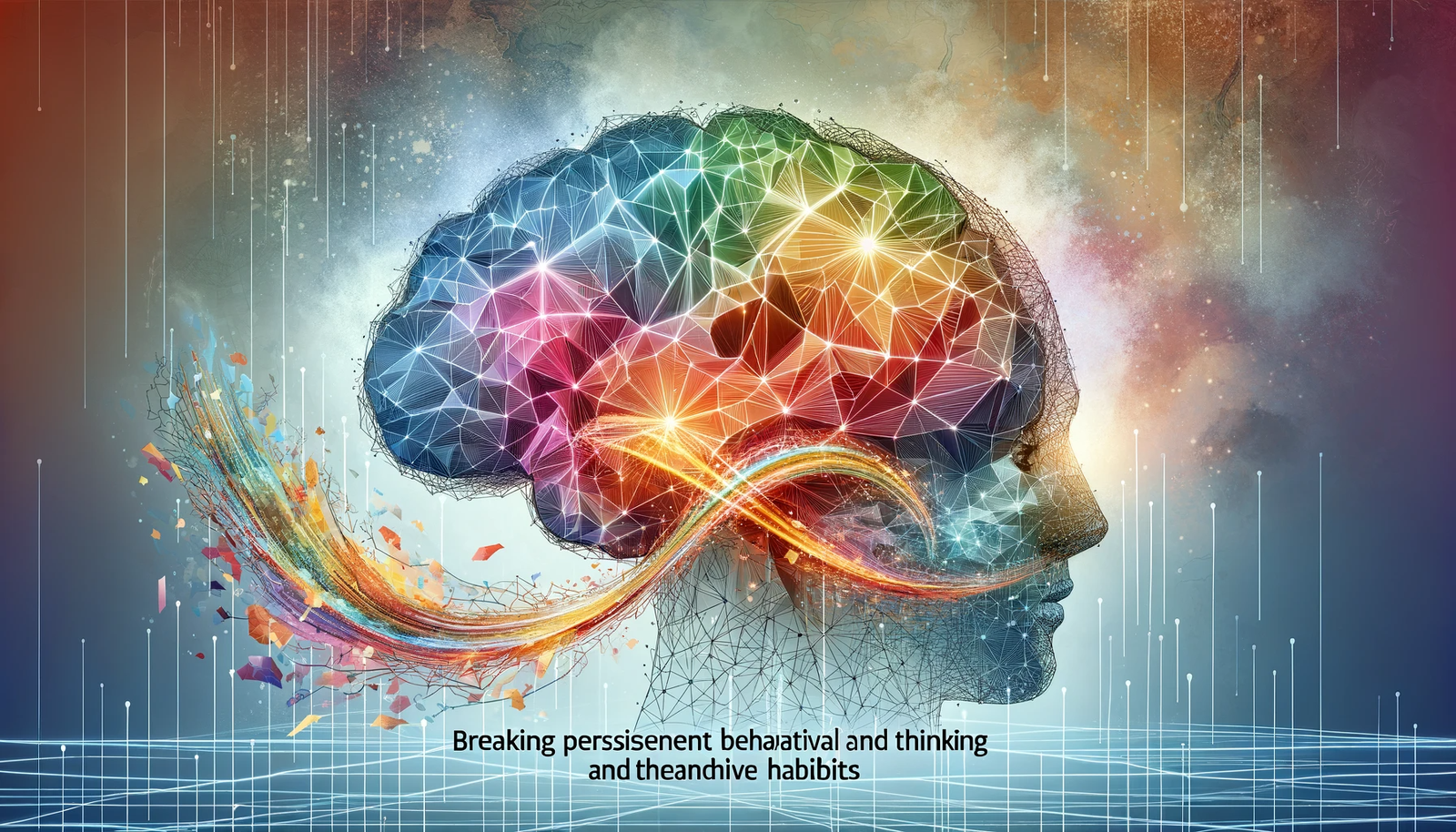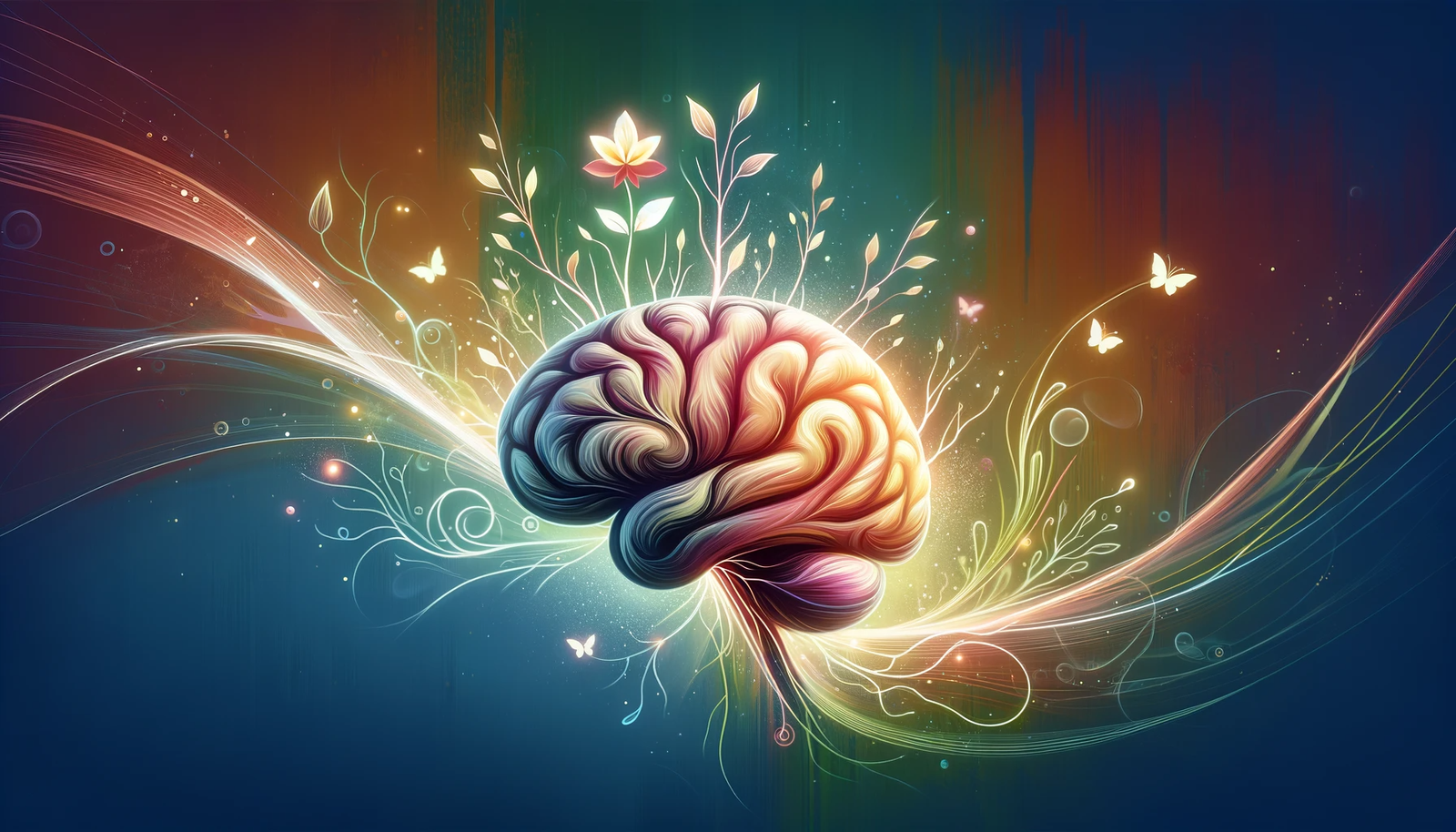Psilocybin for Depression and Anxiety: A Path to Transpersonal Healing
In our continuous journey to understand and alleviate the burdens of mental health conditions like depression and anxiety, the exploration of alternative therapies has led to a groundbreaking area of study: the use of psilocybin. Psilocybin, a naturally occurring psychedelic compound found in certain mushrooms, has recently garnered significant attention in the medical and psychological communities for its potential to not only relieve symptoms of mental health conditions but also induce profound transpersonal and numinous experiences. This blog post delves into the capabilities of psilocybin to transform mental health treatment, focusing on its role in breaking persistent behavioral and thinking patterns, enhancing neuroplasticity and neurogenesis, and facilitating profound shifts in consciousness and worldview.

Breaking Persistent Behavioral and Thinking Habits with Psilocybin
One of the most intriguing aspects of psilocybin therapy is its ability to disrupt entrenched patterns of behavior and thought. These persistent habits often form the core of many mental health issues, including depression and anxiety. Psilocybin’s interaction with the brain’s serotonin 2A receptors triggers a cascade of changes in neural networks, effectively ‘rewiring’ the brain. This process can lead to a significant decrease in the rigidity of thought patterns and behaviors that are characteristic of various psychiatric disorders.
Research suggests that the psilocybin experience can provide individuals with a unique opportunity to observe their thought processes from a new perspective, allowing them to break free from the cycles of negative thinking and behavior. This effect is further enhanced by the compound’s ability to foster neuroplasticity – the brain’s ability to form new neural connections. In essence, psilocybin opens a window for the brain to reorganize itself, offering a fresh start for those who have been trapped in detrimental psychological patterns.
The implications of this are profound. By providing a means to reset established neural pathways, psilocybin therapy presents a promising avenue for treating not only depression and anxiety but potentially a wide range of mental health conditions that are rooted in cognitive and behavioral inflexibility.

Neuroplasticity and Neurogenesis: The Brain’s Response to Psilocybin
A pivotal aspect of psilocybin’s impact lies in its influence on neuroplasticity and neurogenesis. Neuroplasticity refers to the brain’s remarkable ability to reorganize itself by forming new neural connections throughout life. Neurogenesis, on the other hand, is the process of generating new neurons in the brain. Psilocybin has shown a remarkable ability to stimulate both these processes, thereby aiding in the healing and growth of the brain.
When psilocybin binds to serotonin receptors, it triggers a series of reactions in the brain that promote the growth of new neurons and the formation of new pathways. This flexibility in the brain’s wiring is crucial for breaking free from the rigid patterns often associated with mental health disorders. The enhanced neuroplasticity allows for more adaptive and healthy ways of thinking and behaving, facilitating recovery from conditions like depression and anxiety.
Moreover, the growth of new neurons through neurogenesis is especially beneficial in areas of the brain responsible for memory and learning. This can lead to improved cognitive functions and an overall enhancement in mental health and well-being. The potential of psilocybin to foster these processes opens up exciting possibilities for the treatment of various neurological and psychiatric conditions, offering hope for a more effective and holistic approach to mental health care.

Transpersonal Experiences and Life Purpose: The Psilocybin Journey
A profound aspect of psilocybin therapy is its ability to facilitate transpersonal experiences that provide new insights into the nature of consciousness and reality. Transpersonal experiences transcend the usual boundaries of the self, often leading to a sense of oneness or interconnectedness with the universe. These experiences can be deeply transformative, offering individuals a new perspective on their existence and place in the cosmos.
Psilocybin has the unique capacity to induce these states, which can lead to significant shifts in worldview. Users often describe moving away from materialistic perspectives towards embracing concepts like panpsychism, the belief that mind or consciousness is a fundamental aspect of all things. This shift is not just philosophical but deeply personal, often leading to a renewed sense of purpose and meaning in life.
Such experiences can be especially healing for those grappling with feelings of disconnection, existential angst, or mental health issues like depression and anxiety. The sense of unity and interconnectedness fostered by psilocybin can help dissolve feelings of isolation, providing comfort and clarity. The insights gained during these transpersonal experiences are often described as life-altering, offering a new understanding of self, relationships, and the world.

Legal and Safety Considerations in the UK: Navigating Psilocybin Therapy
When considering psilocybin therapy, especially in the context of the United Kingdom, it’s crucial to navigate the legal and safety landscape carefully. The legal status of psilocybin in the UK categorizes it as a Class A drug under the Misuse of Drugs Act, meaning its possession and use are currently illegal outside of licensed research settings. However, the therapeutic potential of psilocybin has led to growing discussions and research into its medical and psychological applications.
In terms of safety, while psilocybin is generally considered to have a low risk for toxicity and addiction, concerns remain regarding its use, particularly related to adverse effects such as panic reactions or the potential triggering of psychiatric conditions. These risks underscore the importance of professional oversight in therapeutic settings. In controlled, clinical environments, where participants are carefully screened, prepared, and supported throughout the process, the incidence of adverse effects is notably low.
The setting in which psilocybin is administered plays a crucial role in its efficacy and safety. A supportive, controlled environment ensures that individuals can safely navigate the psilocybin experience, reducing the risk of negative reactions and maximizing benefits.

The Origins and Therapeutic Applications of Psilocybin
Psilocybin, the psychoactive compound found in certain mushrooms, has a rich history that intertwines with human culture and healing practices. Its origins trace back to ancient times, where it was used in various cultures for religious and spiritual purposes. These traditional uses highlight the deep-rooted connection between psilocybin and the human quest for psychological and spiritual well-being.
In the modern context, the therapeutic applications of psilocybin are being rediscovered and explored. Clinical research and trials have shed light on its potential to treat a range of mental health disorders, including depression, anxiety, and addiction. Psilocybin therapy often combines the compound’s pharmacological effects with psychotherapeutic support, creating a holistic treatment approach. This synergy between the natural compound and modern therapy techniques is opening new avenues for mental health treatment, offering hope and healing to many.
The reemergence of psilocybin in therapeutic contexts signifies a bridge between its historical use and contemporary medical practices, underscoring the importance of integrating traditional wisdom with modern scientific understanding.

The Role of Psilocybin Retreats in Mental Health
Psilocybin retreats are emerging as a novel approach to mental health treatment, offering a unique combination of natural settings and therapeutic guidance. These retreats provide a safe and controlled environment where individuals can explore the healing potential of psilocybin under the supervision of trained professionals, including psychotherapists and facilitators.
At these retreats, participants are often immersed in serene natural surroundings, which enhances the therapeutic process. The tranquil setting, away from the distractions of daily life, allows for deeper introspection and connection with the self. The presence of skilled therapists ensures that participants receive the support they need to navigate their experiences safely and productively.
The retreat model emphasizes the importance of ‘set and setting’ in psychedelic therapy – the mindset of the individual and the physical and social environment in which the substance is consumed. This controlled setting not only maximizes the potential therapeutic effects of psilocybin but also minimizes risks, ensuring a safe and positive experience for participants.
The integration of psilocybin sessions with complementary therapeutic practices, such as meditation, yoga, and group discussions, further enriches the healing journey. These retreats offer a holistic approach to mental health, addressing not just the symptoms but the overall well-being of individuals.

Guidance for Individuals Experiencing Anxiety or Depression
For those grappling with anxiety or depression, finding effective ways to manage and overcome these challenges is crucial. While psilocybin therapy offers promising avenues, it’s important to approach this option with careful consideration and professional guidance. Here are some steps to consider:
Seek Professional Help: Always start by consulting with mental health professionals. They can provide a comprehensive assessment of your condition and recommend appropriate treatment options, including the possibility of psilocybin therapy if it’s available and suitable for you.
Educate Yourself: Learn about the various treatment options available, including psilocybin therapy. Understanding the benefits, risks, and legal status of these treatments can help you make informed decisions.
Consider Your Set and Setting: If exploring psilocybin therapy, be mindful of the ‘set and setting’ principle. This means being in the right mindset and in a safe, supportive environment, ideally under the supervision of trained professionals.
Holistic Approach: Alongside any therapy, consider incorporating holistic practices like mindfulness, meditation, or yoga. These practices can help manage symptoms of anxiety and depression and improve overall well-being.
Build a Support Network: Surround yourself with supportive friends, family, or support groups who understand your journey and can provide encouragement and understanding.
Prioritize Self-Care: Engaging in regular self-care practices can significantly impact your mental
health. This includes maintaining a balanced diet, getting regular exercise, ensuring sufficient sleep, and engaging in activities that bring you joy and relaxation.
- Stay Informed About Legal Developments: As the legal landscape around psilocybin therapy evolves, stay informed about changes that might open up new treatment opportunities.
Remember, the journey to overcoming anxiety or depression is personal and varies from individual to individual. Exploring treatment options like psilocybin therapy should be a well-considered decision made in consultation with healthcare professionals.

Final Notes On Using Psilocybin for Anxiety or Depression
As we conclude this exploration of psilocybin’s potential in treating anxiety and depression, it’s evident that this psychedelic compound offers more than just symptom relief. Psilocybin therapy, particularly in settings like specialized retreats, has the potential to induce profound transpersonal experiences, leading to transformative insights and a deeper connection with oneself and the universe. The safety and efficacy of this therapy, when administered in controlled environments with professional guidance, make it a promising option for those seeking alternative treatments.
While the journey to understand and fully integrate psilocybin into therapeutic practices continues, it is essential to approach this path with mindfulness, respecting legal boundaries and prioritizing safety. For those who resonate with this form of therapy, it represents a beacon of hope — a chance to embark on a journey of healing and self-discovery.
For more information and to explore the possibility of participating in a psilocybin retreat, visit our main retreat page. Here, you can find detailed information about our retreat offerings, ensuring a safe, guided, and transformative experience for those ready to embark on this unique journey.
References
Aaronson, S. T., van der Vaart, A., Miller, T., LaPratt, J., Swartz, K., Shoultz, A., Lauterbach, M., Sackeim, H. A., & Suppes, T. (2023). Single-Dose Synthetic Psilocybin With Psychotherapy for Treatment-Resistant Bipolar Type II Major Depressive Episodes: A Nonrandomized Controlled Trial. JAMA Psychiatry. https://doi.org/10.1001/jamapsychiatry.2023.4685
Agin-Liebes, G. I., Malone, T., Yalch, M. M., Mennenga, S. E., Ponté, K. L., Guss, J., Bossis, A. P., Grigsby, J., Fischer, S., & Ross, S. (2020a). Long-term follow-up of psilocybin-assisted psychotherapy for psychiatric and existential distress in patients with life-threatening cancer. Journal of Psychopharmacology, 34(2), 155–166. https://doi.org/10.1177/0269881119897615
Agin-Liebes, G. I., Malone, T., Yalch, M. M., Mennenga, S. E., Ponté, K. L., Guss, J., Bossis, A. P., Grigsby, J., Fischer, S., & Ross, S. (2020b). Long-term follow-up of psilocybin-assisted psychotherapy for psychiatric and existential distress in patients with life-threatening cancer. Journal of Psychopharmacology, 34(2), 155–166. https://doi.org/10.1177/0269881119897615
Belser, A. B., Agin-Liebes, G., Swift, T. C., Terrana, S., Devenot, N., Friedman, H. L., Guss, J., Bossis, A., & Ross, S. (2017). Patient Experiences of Psilocybin-Assisted Psychotherapy: An Interpretative Phenomenological Analysis. Journal of Humanistic Psychology, 57(4), 354–388. https://doi.org/10.1177/0022167817706884
Garcia-Romeu, A., Barrett, F. S., Carbonaro, T. M., Johnson, M. W., & Griffiths, R. R. (2021). Optimal dosing for psilocybin pharmacotherapy: Considering weight-adjusted and fixed dosing approaches. Journal of Psychopharmacology, 0(0), 0269881121991822. https://doi.org/10.1177/0269881121991822
Reynolds, C. F. I. (2020). Psilocybin-assisted supportive psychotherapy in the treatment of major depression—Quo vadis? JAMA Psychiatry. https://doi.org/10.1001/jamapsychiatry.2020.2901



